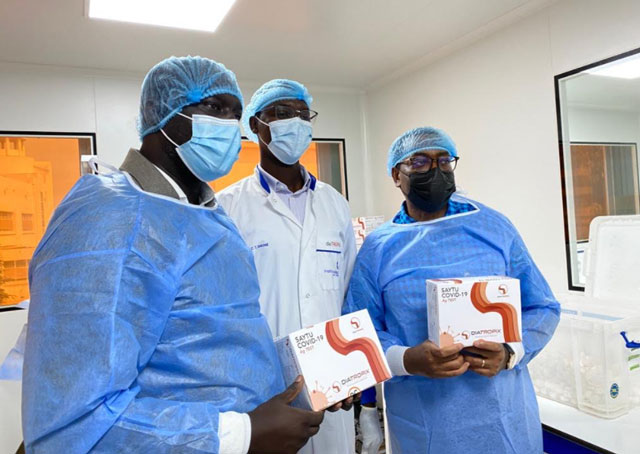
Abidjan, Ivory Coast | THE INDEPENDENT | The African Development Bank’s Board of Directors has approved the establishment of the African Pharmaceutical Technology Foundation, a new groundbreaking institution that will significantly enhance Africa’s access to the technologies that underpin the manufacture of medicines, vaccines, and other pharmaceutical products.
The Foundation will boost the African Development Bank’s commitment to spend at least $3 billion over the next 10 years to support the pharmaceutical and vaccine manufacturing sector under its Vision 2030 Pharmaceutical Action Plan. The Foundation’s areas of work will also be an asset to all other current investments into pharmaceutical production in Africa.
Rwanda will host the African Pharmaceutical Technology Foundation. A common benefits entity, the Foundation will have its own governance and operational structures. It will promote and broker alliances between foreign and African pharmaceutical companies.
African Development Bank Group President, Dr. Akinwumi Adesina said: “This is a great development for Africa. Africa must have a health defense system, which must include three major areas: revamping Africa’s pharmaceutical industry, building Africa’s vaccine manufacturing capacity, and building Africa’s quality healthcare infrastructure.”
During the African Union Summit in Addis Ababa in February 2022, the continent’s leaders called on the African Development Bank to facilitate the establishment of the African Pharmaceutical Technology Foundation. Adesina, who presented the case for the institution to the African Union said: “Africa can no longer outsource the healthcare security of its 1.3 billion citizens to the benevolence of others.” With this bold initiative, the African Development Bank has made good on that commitment.
The decision is a major boost to the health prospects of a continent that has been battered for decades by the burden of several diseases and pandemics such as Covid19, but with very limited capacity to produce its own medicines and vaccines. Africa imports more than 70% of all the medicines it needs, gulping $14 billion per year.
Global efforts to rapidly expand the manufacturing of essential pharmaceutical products including vaccines in developing countries, particularly in Africa, to assure greater access, have been hampered by intellectual property rights protection and patents on technologies, know-how, manufacturing processes and trade secrets.
African pharmaceutical companies do not have the scouting and negotiation capacity, and bandwidth to engage with global pharmaceutical companies. They have been marginalized and left behind in complex global pharmaceutical innovations. Recently, 35 companies signed a license with America’s Merck to produce Nirmatrelvir, a Covid-19 drug. None of them was African.
No institution exists on the ground in Africa to support the practical implementation of Trade Related Intellectual Property Rights (TRIPs) on non-exclusive or exclusive licensing of proprietary technologies, know-how and processes.
The African Pharmaceutical Technology Foundation will fill this important and glaring gap. When fully established, it will be staffed with world-class experts on pharmaceutical innovation and development, intellectual property rights, and health policy; acting as a transparent intermediator advancing and brokering the interests of the African pharmaceutical sector with global and other Southern pharmaceutical companies to share IP-protected technologies, know-how and patented processes.
Adesina said “Even with the decision of the TRIPS Waiver at the World Trade Organization (WTO), millions are dying -and will most likely continue to die – from lack of vaccines and effective protection. The African Pharmaceutical Technology Foundation provides a practical solution and will help to tilt the access to proprietary technologies, knowledge, know-how and processes in favor of Africa”.
The World Trade Organization and the World Health Organization, respectively, welcomed and lauded the African Development Bank’s decision to establish the African Pharmaceutical Technology Foundation.
The Director-General of the World Trade Organization, Dr. Ngozi Okonjo-Iweala, said “The African Pharmaceutical Technology Foundation is innovative thinking and action by the African Development Bank. It provides part of the infrastructure needed to assure an emergent pharmaceutical industry in Africa”.
The Director-General of the World Health Organization, Dr. Tedros Ghebreyesus, said “Establishing the African Pharmaceutical Technology Foundation, by the African Development Bank, is a game changer on accelerating the access of African pharmaceutical companies to IP-protected technologies and know-how in Africa”.
The African Pharmaceutical Technology Foundation will prioritize technologies, products and processes focused primarily on diseases that are widely prevalent in Africa, including current and future pandemics. It will also build human and professional skills, the research and development ecosystem, and support upgrading of manufacturing plant capacities and regulatory quality to meet World Health Organization standards.
While the African Pharmaceutical Technology Foundation is being established under the auspices of the African Development Bank, it will operate independently and raise funds from various stakeholders including governments, development finance institutions, philanthropic organizations among others.
The African Pharmaceutical Technology Foundation will strengthen local pharmaceutical companies to engage in local production initiatives with systematic technology learning and technology upgrading at the plant level.
The Foundation will work with African governments, research and development centers of excellence to strengthen the regional pharmaceutical and vaccine innovation ecosystem for Africa and build skills of the kind needed for the pharmaceutical sector to flourish.
It will also promote closer coordination of the various ongoing medicines and vaccines’ manufacturing initiatives at the regional level to increase collaborative linkages, leverage synergies and partnerships in a pan-African context.
The African Pharmaceutical Technology Foundation will work closely with the African Union Commission, European Union Commission, the World Health Organization, the Medicines Patent Pool, the World Trade Organization, philanthropic organizations, bilateral and multilateral agencies and institutions, and will foster collaboration between the public and private sectors in developed countries and developing countries.
 The Independent Uganda: You get the Truth we Pay the Price
The Independent Uganda: You get the Truth we Pay the Price


